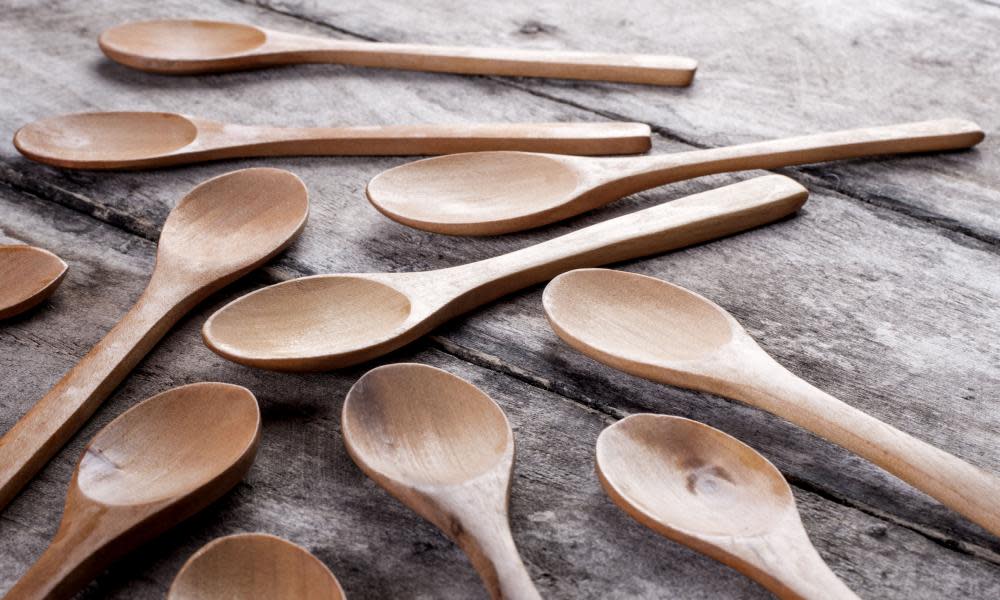People are boiling their wooden spoons on TikTok. I won’t be joining them

A few weeks ago, I finally plucked up the courage and went in … to the shadowy place at the back of the fridge where no hand ever goes (sorry if you were expecting something more daring). To be clear, our fridge is quite clean, relatively speaking: nothing oozes in its salad crisper; no cheese rind awaits death in the place where the butter lives. But the top shelf, where I keep jars, open but not yet empty, was becoming too crowded. In the front row, I could see a Kilner of gherkins and some Daylesford blackcurrant and violet jam bought (ha) with a recent win on EuroMillions, and neither looked to me as if they’d give us botulism. But the Lord alone knew what lurked behind. Something had to be done.
Two hours later, and the dishwasher was full of jars, and the bin of their (mostly unrecognisable) contents: a satisfying morning’s work, and one that got me thinking about what else in the kitchen I might profitably clean. The spice cupboard, which looks a bit dusty? The space I laughably call my pantry, which has lately taken on a somewhat forlorn aspect? What I absolutely did not consider, however, was joining the crowd by boiling my wooden spoons. I’m the child of a microbiologist. I hold to the notion that, broadly speaking, wood is naturally antibacterial. I’ve had the same chopping board for more than 15 years, and I’ve only ever wiped it with a damp, soapy cloth; no one has died so far.
The creepy trend for boiling spoons – it is said to result in gruesome excretions – began on TikTok. A woman in the US called Lulaboo Jenkins posted a video of a ritual spoon-boiling that has been watched by 49 million people. I read about this, and even as I rolled my eyes – how utterly deranged, I thought – I recognised it as yet another sign of the strange state we are in. Our attitude to hygiene, and by extension to dirt in all its multifarious forms, is increasingly strange and stupid. Every city street is strewn with fast food wrappers; I’ve never known them to look more filthy. But while this seems to induce no disgust whatsoever in most people – they stroll on by, oblivious to the ketchup on their heels – much of the rest of life induces rank nausea. Still, we struggle to convince people to eat items that are past their sell-by date. Still, people cannot deal with food that has not been ruthlessly sanitised for them in advance.
Fish must be decapitated, and meat wrapped in clingfilm; shoppers favour potatoes that carry no traces of soil, and apples that come in plastic bags. Something tells me that the spoon-boilers are the same people who are timid to the point of phobic when it comes to the distant prospect of mould; the carcass of a chicken; a foodstuff that has very briefly fallen on the floor; any kind of dish whose appearance is less than Insta perfect. It’s all highly paradoxical. What they cannot see does not disturb them; most would balk if they knew what went on behind the scenes so far as the food chain goes. But equally, what is invisible is also borderline terrifying. These are the people who are forever spraying their work surfaces with chemicals, and who get extremely tense around shared utensils.
But back to wooden spoons – and in fact, to all things wooden. I love an aged wooden spoon; in every way, they are more aesthetically pleasing than new (or boiled) ones. In junk shops, I’m always on the hunt for ancient bread boards. They are so beautiful; I favour those with Bible verses carved around their edges. Life in the kitchen should involve pleasing haptic experiences, and there is nothing better than holding in your hand an object that is worn with use and love, but which is still useful.
I may have mentioned before that I own an old bread knife with a wooden handle, on which are written the words “Manners makyth man”. The first “m” is almost missing now, the victim of several generations of thumbs. This knife is no longer quite sharp enough for some modish crusts, but using it makes me feel happy and grounded: the kind of person (even more than usually) who couldn’t care less about a few germs.

 Yahoo News
Yahoo News 
